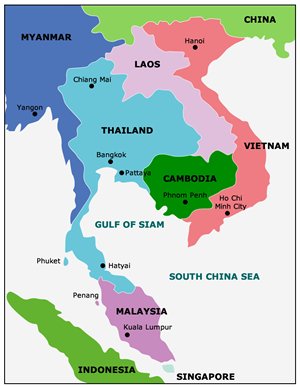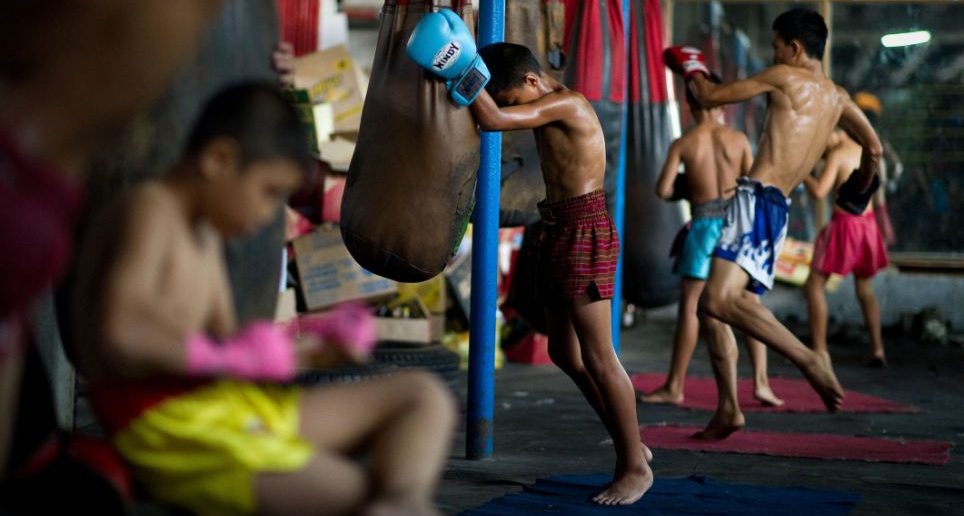Have you ever dreamt about learning Muay Thai in Thailand? Maybe you’re already in Thailand at a Muay Thai Camp and you want to be able to extend your stay? If you are looking to finance your martial arts training in Thailand then maybe this StudyMartialArts.Org Guide to Learning Muay Thai in Thailand and Teaching English will be of help to you.
In this guide you’ll learn how to teach English in Thailand where the art of 8 limbs is king.
Teaching English in Thailand
Thailand is in the centre of Southeast Asia bordering Cambodia, Laos, Malaysia, and Myanmar. Those living or traveling to Thailand have the benefit of being able to easily visit and discover other countries, cultures and indeed martial arts.

Thailand is the centre of Southeast Asia.
The majority of people that come to Teach English and Study Martial Arts Abroad often are as follows:
- Those taking a Gap Year who are looking for an adventure travel experience that successfully combines learning, culture, and self-discovery. For example those wishing to learn kung fu in China, combine language learning and martial arts, combine martial arts and teaching as a way to fund the experience.
- People who are what to experience something new or full-fill a dream or ambition to travel.
- People interested in a new career.
- People who, have a passion for Muay Thai, for traditional martial arts and want to, immerse themselves in that culture.
So what makes teaching English the easiest option for martial arts adventure travellers seeking to fund their training? The simple answer is the demand. English continues to be the language of choice for business and remains one of the most widely spoken languages in the world.
The demand for teachers is therefore high. Nonetheless conditions for teachers and pay varies considerably depending on the location, your experience and the type of school you work for. Its not unknown for teachers to be expected to deal with classes ranging from 10 to as many as 45.
So I guess the next question is, what do you need to become an English teacher in Thailand?
What do you need to teach English in Thailand?
If you wish to teach English abroad the best way to prepare is to do your research. Conditions, and requirements for schools in Thailand vary greatly. Some request the following:
- Proof that you’ve completed a Thai Cultural Course
- A TEFL certificate or equivalent is required
- Criminal Record Report
- Relevant Diploma and or previous teaching experience
The rule of thumb with regards to requirements is that any diploma will be an advantage; those with a three-year degree can teach in high schools, and those with a masters can teach at university level. Obviously, a relevant teaching degree would be even better and offer the best opportunities as well as wages. That being said many of you reading this will be primarily looking for part-time work in which case you can easily get online TEFL certification on advance of your travels or while traveling.
Teaching English as a Foreign Language (TEFL certification)
A TEFL certification although not a basic requirement, can provide you with the tools, training and confidence to teach English as a Foreign Language. It provides those with no experience the fundamental basics of teaching. During a TEFL course you will learn how to create appropriate “lesson plans” in order to keep students engaged in your lessons.
TEFL or an equivalent accreditation is not only useful because it teaches you how to teach English to foreign language learners. It also helps potential employers successfully apply on your behalf for a legitimate Work Permit, as well as obtain a license from the Teachers’ Council of Thailand.
What visa will you need?
A B-type Non-Immigrant visa is required to work in Thailand. This type of visa allows you to work for three consecutive months, after which the school will send a request for a work permit which will let you extend this for a year. The advantage of this is that you will no longer need to do a visa run. A Non-Immigrant B-type visa allows you to work regularly in Thailand and also open a bank account.
Here’s how it normally works when you apply from your home country. Once you get an offer possibly via teaching sites like Dave’s esl cafe, Ajarn, or th.jobsdb.com/th you will have to visit the Thai consulate in your home country. You’ll need to bring your passport and an acceptance letter from the school. Once you have these you will be able to apply for your visa. The fee for this is about 60 Euro. Once you get your visa you’re good to go.
What if you’re already in Thailand?
If you’re already in Thailand with a tourist visa and training at a Muay Thai camp, you will probably have a one month visa. Those on this type of visa shouldn’t be working as its illegal. Nevertheless, many schools will employ you all the same and help you apply for a work visa.
A good martial arts student and teacher
If you want a good job in Thailand presentation is the key. Sloppy martial arts often goes hand in hand with being a sloppy English teacher. Age, race and sex counts so if you really want that job scrub up and show the Thai your love for their culture and martial arts. The key to getting along is being calm, controlled, having a good sense of humour and being social and culturally aware.
Finding the right school
In Thailand there are government-run schools, private schools and public schools. State schools run from Monday to Friday during normal school hours. National holidays, and paid vacations are one of their biggest benefits.
Language schools and private schools often pay more and offer better benefits, but require you to work evenings and weekends.
Being able to properly balance your martial arts training and teaching will now be your biggest challenge. So having your training camp or gym close to your place of work makes a lot of sense.
Opening a bank account
If you work in Thailand you’ll need somewhere to put that hard earned cash. You’ll have a number of choices. Maybe your employer will suggest a particular one. Either way having a bank account is much better than storing it under your bed or in a wallet. You can read this article to learn more about how to open a bank account in Thailand.
So now you have the basics on teaching English in Thailand. You’re now ready to pick the right Muay Thai Training Camp where finding top quality training and English teaching opportunities is possible.





2 Comments
Hi David
I read your latest share about teaching english and training in Thailand.I have been attending TESOL course to be able teach english at home and abroad.In addition to tesol i completed Teaching Knowledge Test(one of the cambridge asssesment certificate).Also I graduated from faculty.
However i am not native speaker.Is it possible for me to find a teaching job in there??
Hi Cem, it’s definitely possible however, it will likely be more difficult. In addition to that you will likely get some employers who will use that excuse to pay you less.